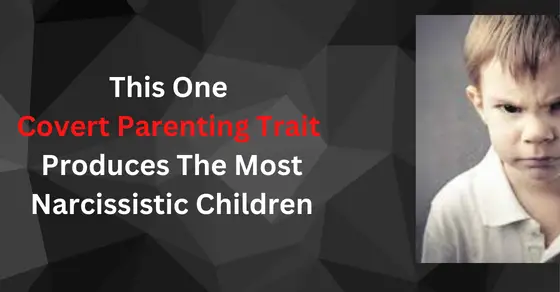Narcissism is unfortunately becoming a more common mentality and way of living. We have become more aware of what it is and how narcissistic individuals impact those around them. Their friends, their family, their parenters, their coworkers, even strangers! Maybe you have experienced a narcissist close up in person, or have heard stories from different friends or family, but if one thing is clear it is that they can be more than a bit unpleasant to be around.
According to the Mayo clinic:
“Narcissistic personality disorder is a mental disorder in which people have an inflated sense of their own importance, a deep need for admiration and a lack of empathy for others. But behind this mask of ultra confidence lies a fragile self-esteem that’s vulnerable to the slightest criticism.”
Narcissism can be said to be a genetic trait, but, more often than not, it is developed overtime in relation to a specific parenting style. But can it really be a genetic trait? And if it is, can a genetic trend be switched? That’s a great question.
The study of epigenetics is described as the study of what controls gene expression. Epi means above, so epi-genetics simply means above genetics. This has taught us that 2/3rds (or 66%) of gene expression is based on the environment of the gene. In other words, what surrounds the gene determines whether the lightswitch of that gene is turned on or off. This reminds us that even if we have a genetic predisposition to narcissims (which I even question myself) we have the power to turn these genes off by giving these genes a healthy environment to keep ghese genes off.
This leads us to research on that breaks down parenting styles that show narcissistic personality.
Researchers were curious and wanted to know what parenting styles were more likely to create a narcissistic personality in their children, so they surveyed 565 children ages 7 to 11. They also interviewed their parents (415 mothers and 290 fathers). To gather as much data as possible.
Their results were quite shocking and valuable for revealing how narcissitic parents and children operate. The findings showed that parents who praise their children excessively, tell them they are superior to others, and deserve special treatment are more likely to raise a narcissistic child who may grow up to be a narcissistic adult. This is especially true for children between the ages of 7 and 11. There’s nothing wrong with praising your children, but praising them over other children and making it known that your child is better than others is a big red flag.
Researchers stated in Proceedings of the National Academy of Sciences Found This:
“When children are seen by their parents as being more special and more entitled than other children, they may internalize the view that they are superior individuals, a view that is at the core of narcissism. But when children are treated by their parents with affection and appreciation, they may internalize the view that they are valuable individuals, a view that is at the core of self-esteem.”
In other words, it is important to show affection to your children, but not teach your children that they have your affection because they are better than everyone else around them. It is also important to keep in mind that narcissism may develop because of a child’s need to protect an insecurity. Narcissim is based around control and this is how they continue to manipulate and keep others under their grip.
You want a child to develop strong self-esteem and have a good sense of self love and self worth. There are many ways to help a child feel good about themselves without encouraging these narcissistic tendencies. Here are some tips that will help you do just that:
Teach children to connect with people not to focus on impressing them. Narcissistic parents focus on their children impressing others and this comes from a place of conditional love and acceptance. Connection is more powerful than impressing someone. Teach your children to be genuine and authentic, real, whoever they are, not to show off and impress.
Make sure to make it very clear, even voice it and tell your child that you love spending time with him or her because you love him or her, not because of what the child can do or what they are capable of. This is important because your child will mimic this exhcange in future relationships that they have with partners, lovers, friends, everyone!
Teach your children the importance of empathy. Children really do need to understand that their actions can hurt another person. By teaching your child to be aware of other’s emotions or feelings, and to be kind and loving, you are giving them social skills and emotional wisdom that will grow with them into adulthood. This will make them emotionally resilient as they won’t take things as personally and they will be more emotionally sensitive when delivering hard messages to others. Empathy is far more valuable than sympathy and healthy grounded people are more empathetic while narcissists may have sympathy but never empathy.
Encourage your children to have healthy friendships. It is important to allow your children to build friendships on their own without your facilitation in the dynamic. Friends will keep it real with them and tell them the truth, especially as they age and become teenagers. They will also teach them that they do not need to be perfect to be liked because real friends keep it real with you whether in childhood or adulthood. These are also great times that become very ideal for teaching your child how their actions affect others. The words we use, the delivery we use, how we engage can effect how someone feels.
It’s not our responsibility to walk on eggshells all the time, but we can be tender, kind and loving even when delivering difficult truths.
Lastly, teach your children to be gentle with others. At the root of most narcissists, and especially narcissistic children, they have been found to have low self-esteem. Discipline is important here, because if there is no discipline nothing changes for the better. Remember that you can still discipline with respect and care. Remind them that it is okay to make mistakes as a child or adult, but it is important to apologize when you are wrong. Humility keeps us grounded and allows us more opportunity for growth. Let them know when they did something wrong, but then teach them how to make it right. To be solution oriented and complete in their own mind, thoughts, emotions and character.
If you’d like to learn more about how not to raise a narcissistic child, Watch this valuable video below!
Recommended Reading:
5 Signs You Were Raised By A Narcissistic Parent And How To Stop it From Affecting You Today





